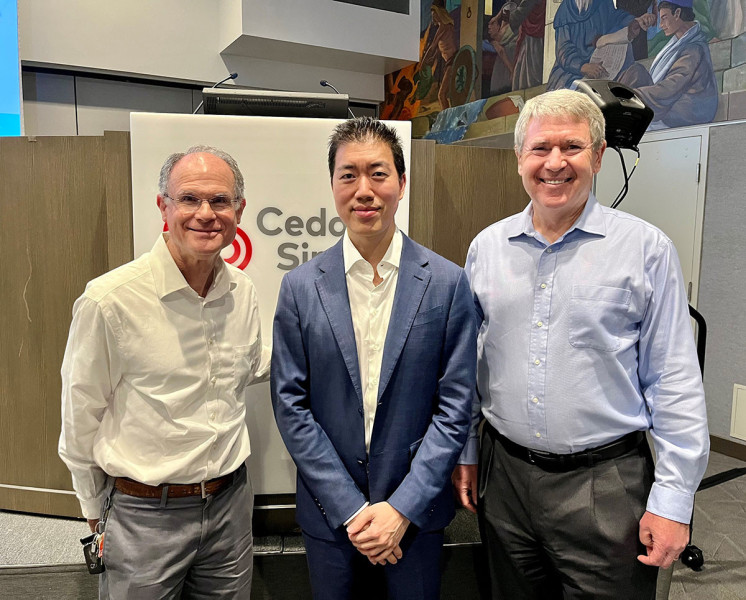Research Day: Scientists Connect, Find Inspiration in Innovation
As Cedars-Sinai Spotlights More Than 120 Research Projects, Prominent Scientist David R. Liu, PhD, Encourages Scientists to Keep Searching for Answers
Cedars-Sinai investigators, faculty members and clinicians came together in Harvey Morse Auditorium on March 27 for the 12th annual Research Day, featuring keynote speaker David R. Liu, PhD, and more than 120 poster presentations.
Jeffrey A. Golden, MD, executive vice dean of Research and Education at Cedars-Sinai, and Kenneth E. Bernstein, MD, professor of Pathology and Laboratory Medicine, welcomed attendees and introduced Liu, who visited Cedars-Sinai from Boston.
A Compelling Keynote
Liu is the Richard Merkin Professor and director of the Merkin Institute of Transformative Technologies in Healthcare, vice chair of the faculty at the Broad Institute of Massachusetts Institute of Technology and Harvard University, the Thomas Dudley Cabot Professor of the Natural Sciences at Harvard University, and a Howard Hughes Medical Institute investigator.  According to Bernstein, Liu also is a bonsai tree enthusiast, woodworker, and dynamite poker player.
According to Bernstein, Liu also is a bonsai tree enthusiast, woodworker, and dynamite poker player.
Best known for his pioneering research in the engineering, evolution, and in vivo delivery of genome editing proteins—such as base editors to study and treat genetic diseases—Liu detailed several studies conducted in his laboratory. His work has influenced the understanding of proteins with novel therapeutic potential leveraging a methodology he pioneered, phage-assisted continuous evolution. His lab also focuses on the discovery of bioactive synthetic small molecules and synthetic polymers using DNA-templated organic synthesis and DNA-encoded libraries.
“The work happening now is moving us closer to clinical treatments for patients,” Liu said.
Attendees walked away from the keynote address with two major takeaways:
- Base editing rescues sickle cell disease, progeria and spinal muscular atrophy in animals by correcting the cause of each genetic disease.
- Prime editing enables versatile and efficient therapeutic substitutions, insertions and deletions in animals including primates.
Investigators Present Findings
Following the keynote address, more than 120 Cedars-Sinai investigators showcased research projects they developed at Cedars-Sinai.
One participant, Madelyn Arzt, a research associate III in the Sharma Laboratory, a member of the Board of Governors Regenerative Medicine Institute, presented an abstract titled, “Growth and Transfection of Human-Induced Pluripotent Stem Cells in Commercially Available Culture Plates During a Private Spaceflight Mission.”
The project overall, Arzt said, evaluates whether induced pluripotent stem cells could be manufactured in space by astronauts. More recently, their research evaluated whether the microgravity conditions in space can improve stem cell production. She joined colleagues from the Sharma Laboratory when they traveled to Florida in May 2023 to see a space mission take off with Cedars-Sinai’s stem cells aboard.
Research Day, Arzt said, is another important step in her journey to earning her doctorate and eventually running a lab, like her mentor, Arun Sharma, PhD.
“Research Day is such a great way to get exposed to the breadth of research being conducted across departments and institutes. It also fosters communication and collaboration with so many other individuals you may not get an opportunity to interact with daily,” Arzt said. “I am eager to make these connections that facilitate further collaborations with my colleagues.”
Award-Winning Work
Noel Bairey Merz, MD, director of the Barbra Streisand Women's Heart Center in the Smidt Heart Institute and principal investigator of the National Institutes of Health Microvascular Aging and Eicosanoids - Women's Evaluation of Systemic Aging Tenacity (MAE-WEST) Specialized Center for Research Excellence (SCORE), recognized two researchers with the “Sex as a Biological Variable Award." The award recognizes investigators whose research incorporates sex differences into the design and analysis of their research.
“In the classroom and in their training, our investigators learn how to develop research questions and study designs specific to sex differences in both females and males,” Bairey Merz said. “It’s critically important for women’s health because so often either male animals or male cells have been preferentially studied, which doesn’t allow for precision medicine opportunities for either sex.”
Amelia Andrews, a research associate I in the Goodridge Laboratory, also a member of the Board of Governors Regenerative Medicine Institute, received first place for her abstract titled “Roles of Sex Chromosomes and Gonadal Hormones in Monocyte and Macrophage Sex Dimorphism.”
Tania Gonzalez, PhD, a postdoctoral scientist in the Pisarska Laboratory in the Department of Obstetrics and Gynecology, received second place for her abstract titled, “First Trimester Human Placenta DNA Methylation Correlates to Maternal Estradiol Levels.”
“I’m really honored to receive this recognition of our work,” said Andrews. “The poster session was a great opportunity to get feedback and ideas for future studies from other investigators. Macrophages are thought to be the most sex dimorphic immune cells and I’m excited to be studying the fundamental mechanisms underlying their influence on inflammation and human disorders.”
Follow Cedars-Sinai Academic Medicine on Twitter for more on the latest basic science and clinical research from Cedars-Sinai.




